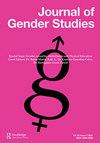‘Could this really be a place for me?’ Women’s experiences in game jams and video game communities
IF 1.5
3区 社会学
Q2 SOCIAL ISSUES
引用次数: 0
Abstract
ABSTRACTVideo game communities, as new emerging creators of contemporary culture, have been identified as paradigmatic gendered contexts and are considered essential for understanding gendered contextual dynamics in contemporary society. This research is based on a multi-sited ethnography study of five game jams as contexts of creation and participation in video game communities, to which was added discussion from eight focus groups and an online forum with 30 female participants. It explores and discusses three analytic emerging dimensions about the perceived gendered dynamics, experiences, interactions and characteristics of these contexts through the women’s perspectives, silences and meanings. In particular, it focuses on the unequal representation and uncovered power dynamics between men and women, the perceived gender stereotypes, and the internalised discourses. Considering the perceptions of devaluing women´s capacity, experience and knowledge, is discussed the impacts on women’s participation. The importance of decoding the video game-gendered contexts is reinforced to create gender-integrated and gender-sensitive environments towards a more diverse and inclusive gaming culture.KEYWORDS: Video game communitiesgendered contextswomen’s experiencesgame jams AcknowledgmentsThis work was supported by FCT - Foundation for Science and Technology, IP, and co-funded by the European Social Fund, under the Human Capital Operational Programme (POCH) from Portugal 2020 Programme, within the Doctoral Programme in Education of the University of Porto [grant no. PD/BD/135578/2018]. And by FCT within the scope of the strategic program of CIIE - Center for Research and Intervention in Education at the University of Porto [ref. UID/CED/00167/2019; UIDB/00167/2020].Disclosure statementNo potential conflict of interest was reported by the author(s).Additional informationFundingThis work was supported by the Fundação para a Ciência e a Tecnologia [PD/BD/135578/2018].Notes on contributorsLucinda SaldanhaLucinda Saldanha is a doctoral fellow (financed by the Foundation for Science and Technology - Portugal) and a doctoral student in the Doctoral Program in Educational Sciences at the Faculty of Psychology and Educational Sciences, University of Porto, Portugal. Graduated in Psychology and Master’s in Political and Citizenship Psychology (FPCEUP) and Art Studies (FLUC), she worked as a researcher in the project JoSeES - Serious Games in Higher Education: Impacts, Experiences and Expectations, at the Educational Research and Intervention Center (CIIE), as a psychologist in several public schools, and as a social intervention professional, in community projects. Developed publications for young people in active citizenship and citizen art and has experience in participation and leadership in civic and cultural associations.Sofia Marques da SilvaSofia Marques da Silva is an Associate Professor at the Faculty of Psychology and Educational Sciences of the University of Porto (FPCEUP), Portugal, teaching experience in research methodologies, sociology of education and youth cultures. She is a member of the Center for Research and Intervention in Education (CIIE) of the University of Porto. She has been involved in several European and international projects related to vulnerable people and education, ethnographic and life stories research on youth cultures, gender and education, and children and young people from rural and border regions. She is a member of NESET II, the EC’s DGEAC’s advisory network of experts working on the social dimension of education and training. She is Deputy President of the Portuguese Society of Education Sciences. She has been publishing at national and international levels. She is the Editor-in-chief of the journal Ethnography & Education (Taylor & Francis/Routledge; 2018-2022).Pedro D. FerreiraPedro D. Ferreira is an Assistant Professor at the Faculty of Psychology and Education Sciences, University of Porto and a member of CIIE - Centre for Research and Intervention in Education. He holds a PhD in Psychology and his main research focus is the political participation and the political development of young people and adults. More recently, he has been particularly interested in researching how digital contexts, technologies and media contribute to political subjectivation and political education. He has been a member of various national and international projects, and he has coordinated national and international projects on these topics (JoSeES - ‘Serious Games in Higher Education: Impacts, Experiences and Potential’; 2016-2019, FCT), DISK - Digital Immigrants Survival Kit (2019-2022, ERASMUS+). He is a member of the Portuguese Society of Education Sciences (SPCE).“这里真的适合我吗?”女性在游戏jam和电子游戏社区中的体验
摘要电子游戏社区作为当代文化的新兴创造者,被认为是性别语境的典范,是理解当代社会性别语境动态的必要条件。这项研究是基于对5个游戏jam的多站点人种学研究,将其作为电子游戏社区创造和参与的背景,并添加了来自8个焦点小组和30名女性参与者的在线论坛的讨论。它通过女性的视角、沉默和意义,探讨和讨论了这些语境中感知到的性别动态、经验、互动和特征的三个分析新兴维度。它特别关注男女之间不平等的代表性和揭示的权力动态,感知到的性别刻板印象,以及内化的话语。考虑到贬低妇女的能力、经验和知识的看法,讨论了对妇女参与的影响。解码电子游戏性别背景的重要性被强化,以创造性别融合和性别敏感的环境,以实现更多样化和包容性的游戏文化。关键词:视频游戏communitiesgendered contextswomen experiencesgame堵塞AcknowledgmentsThis工作受到了FCT -基础科学和技术,IP,欧洲社会基金,资助的,发现下人力资本运营项目(POCH)从葡萄牙2020项目,在波尔图大学的教育的博士项目(批准号PD / BD / 135578/2018)。在中国国际进口博览会战略项目范围内——波尔图大学教育研究与干预中心[ref. UID/CED/00167/2019;/ 00167/2020选答)。披露声明作者未报告潜在的利益冲突。本研究得到了 科学与技术基金(Ciência e a tecologia) [PD/BD/135578/2018]的支持。作者简介:halucinda Saldanha是葡萄牙波尔图大学心理与教育科学学院教育科学博士项目的博士生(由葡萄牙科学技术基金会资助)。毕业于心理学和政治与公民心理学硕士学位(FPCEUP)和艺术研究硕士学位(FLUC),曾在教育研究与干预中心(CIIE)担任“JoSeES -高等教育中的严肃游戏:影响,经验和期望”项目的研究员,在几所公立学校担任心理学家,并在社区项目中担任社会干预专业人员。为积极公民和公民艺术方面的年轻人编写出版物,并具有参与和领导公民和文化协会的经验。索菲亚·马奎斯·达席尔瓦,葡萄牙波尔图大学心理与教育科学学院副教授,教授研究方法论、教育社会学和青年文化。她是波尔图大学教育研究与干预中心(CIIE)成员。她参与了多个欧洲和国际项目,涉及弱势群体和教育、青年文化、性别和教育、农村和边境地区儿童和年轻人的民族志和生活故事研究。她是NESET II的成员,NESET II是欧共体教育与培训委员会的专家咨询网络,致力于教育和培训的社会层面。她是葡萄牙教育科学学会的副主席。她一直在国内和国际上发表文章。她是《民族志与教育》杂志的主编(Taylor & Francis/Routledge;2018 - 2022)。Pedro D. Ferreira,波尔图大学心理与教育科学学院助理教授,中国国际进口博览会教育研究与干预中心成员。他拥有心理学博士学位,主要研究方向是年轻人和成年人的政治参与和政治发展。最近,他对研究数字环境、技术和媒体如何促进政治主体化和政治教育特别感兴趣。他是多个国家和国际项目的成员,并协调了这些主题的国家和国际项目(JoSeES -“高等教育中的严肃游戏:影响,经验和潜力”;DISK -数字移民生存工具包(2019-2022,ERASMUS+)。他是葡萄牙教育科学学会(SPCE)的成员。
本文章由计算机程序翻译,如有差异,请以英文原文为准。
求助全文
约1分钟内获得全文
求助全文
来源期刊

Journal of Gender Studies
Multiple-
CiteScore
4.40
自引率
0.00%
发文量
52
期刊介绍:
The Journal of Gender Studies is an interdisciplinary journal which publishes articles relating to gender from a feminist perspective covering a wide range of subject areas including the Social and Natural Sciences, Arts and Popular Culture. Reviews of books and details of forthcoming conferences are also included. The Journal of Gender Studies seeks articles from international sources and aims to take account of a diversity of cultural backgrounds and differences in sexual orientation. It encourages contributions which focus on the experiences of both women and men and welcomes articles, written from a feminist perspective, relating to femininity and masculinity and to the social constructions of relationships between men and women.
 求助内容:
求助内容: 应助结果提醒方式:
应助结果提醒方式:


